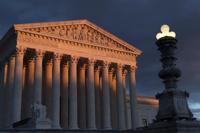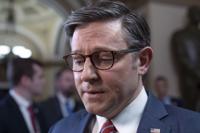On the left and right, Supreme Court justices seem to agree on a basic truth about the American system of government: No one is above the law, not even the president. But former President Donald Trump and his legal team are putting that truth to the test on Thursday when the high court takes up Trump’s bid to avoid prosecution over his efforts to overturn his 2020 election loss to President Joe Biden. Even if the high court agrees with lower courts that have so far rejected Trump's claim, the timing of its decision may be as important as the outcome. Trump wants to delay the trial until after the November election, and the later the justices issue their decision, the more likely he is to succeed.
Search / 4 results found Showing: 4 of 4
Eleven Republicans who submitted a document to Congress falsely declaring Donald Trump beat Joe Biden in Arizona in the 2020 presidential election have been charged with conspiracy, fraud and forgery. Arizona becomes the fourth state to bring charges against “fake electors.” The eleven people who had been nominated to be Arizona’s Republican electors met in Phoenix on Dec. 14, 2020, to sign a certificate saying they were “duly elected and qualified” electors and claimed Trump had carried the state. The document was later sent to Congress and the National Archives, where it was ignored.
Investigator says Trump, allies were uncharged co-conspirators in plot to overturn Michigan election
A state investigator in Michigan says he considers former President Donald Trump and some key allies to be uncharged co-conspirators in a scheme to claim that he had won Michigan in the 2020 election. Trump and Mark Meadows were among the names that came up during the cross-examination of investigator Howard Shock. Shock's work led to charges of forgery against more than a dozen people. A judge is holding hearings in the case. In Michigan, authorities say more than a dozen Republicans sent certificates to Congress falsely declaring they were electors and that Trump had won the state in 2020.
Staring down a decision so consequential it could alter the course of history -- but also end his own career -- House Speaker Mike Johnson prayed for guidance. A conservative Christian, he wrestled deeply over whether to lead the House in approving $95 billion in desperately needed war-time aid for Ukraine, Israel and other U.S. allies, which many in his own Republican majority opposed. Or, he could do nothing, halting the flow of U.S. aid and potentially saving his own job, but leaving Ukraine to fight Russia without the U.S. In the end, Johnson told a colleague, he wanted to “be on the right side of history.”














